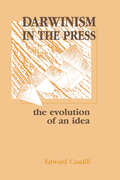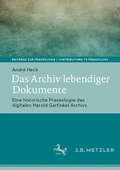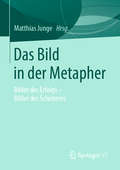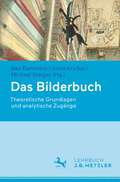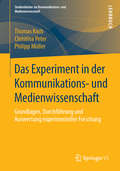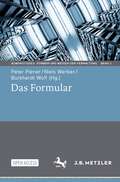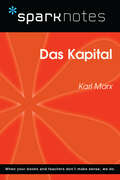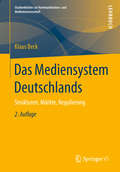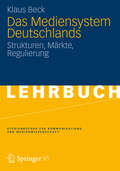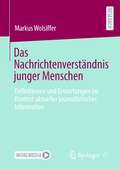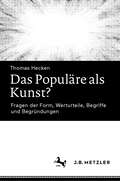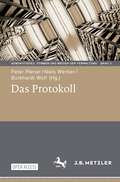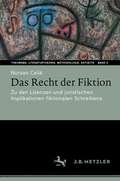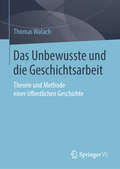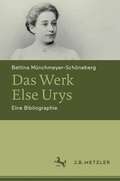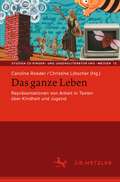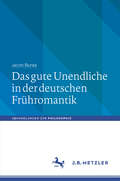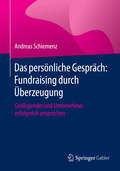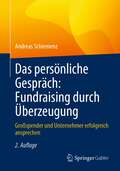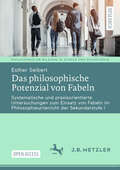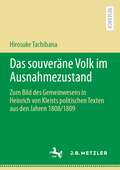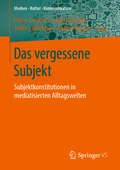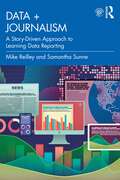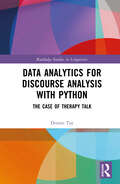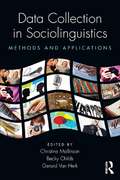- Table View
- List View
Darwinism in the Press: the Evolution of An Idea (Routledge Communication Series)
by Edward CaudillNumerous books and articles have outlined Darwin's impact on American scientists, philosophers, businessmen, and clergy in the 19th and early 20th centuries. Few, however, have undertaken a study of Darwinism in the form in which it was presented to most Americans -- popular newspapers and magazines. The main concern of this book is to identify how the press is treated as a part of our culture - - pointing to its ability to shape and to be shaped by the forces that act on the rest of society and its ability to be critical in the interpretation of ideas for "the masses."
Das Archiv lebendiger Dokumente: Eine historische Praxeologie des digitalen Harold Garfinkel Archivs (Beiträge zur Praxeologie / Contributions to Praxeology)
by André HeckAls „Vater&“ der Ethnomethodologie war Harold Garfinkels übergreifendes Anliegen „the study of the everyday practices used by the ordinary members of society in order to deal with their day-to-day lives&”. Seine Herangehensweise und die Konzipierung der Ethnomethodologie entspringen fundamental einer Kritik an Auguste Comtes Individualismus, welche zuerst von Émile Durkheim vorgetragen und von Talcott Parsons weiterentwickelt wurde, welcher schließlich Garfinkels Dissertation an der Universität Harvard betreute. In den folgenden sieben Jahrzehnten wurde die Ethnomethodologie zu einer ebenso einflussreichen wie kontrovers diskutierten Strömung, nicht nur innerhalb der Soziologie, sondern in einer Vielzahl von Wissenschaftszweigen. Die vorliegende Arbeit zeigt, wie der Aufbau eines virtuellen Archivs basierend auf der Sammlung von Unterlagen aus Harold Garfinkels persönlichem Büro einen Beitrag zur Entwicklung einer „Sociological Theory of Information&“ in seinem Sinne leistet.
Das Bild in der Metapher: Bilder des Erfolgs – Bilder des Scheiterns
by Matthias JungeBilder und bildliche Vorstellungen bestimmen von der frühesten Kommunikation an unseren Zugang zur Welt. Das Ziel des Bandes ist eine umfassende Aufklärung der Prägung unserer Welt durch die verwendeten Bilder entlang ausgewählter Beispiele alltäglicher Bildlichkeit.
Das Bilderbuch: Theoretische Grundlagen und analytische Zugänge
by Ben Dammers Anne Krichel Michael StaigerDas Bilderbuch ist ein vielschichtiges multimodales Erzählmedium, das in den vergangenen Jahrzehnten einen tiefgreifenden ästhetischen Wandel durchlaufen hat. Dieser Band bietet eine umfassende Grundlage für die Arbeit in Lehrveranstaltungen: Im ersten Teil wird in die Theorie und Geschichte des Bilderbuchs eingeführt und ein sechsdimensionales Analysemodell vorgestellt. Der zweite Teil enthält fünfzehn Modellanalysen mit jeweils unterschiedlichen Fokussierungen, z.B. zu Aspekten der bildlichen und sprachlichen Gestaltung im Bilderbuch oder zu ausgewählten Gattungen und Themen. – Mit Leitfragen zur Analyse und vielen farbigen Abbildungen.
Das Experiment in der Kommunikations- und Medienwissenschaft: Grundlagen, Durchführung und Auswertung experimenteller Forschung (Studienbücher zur Kommunikations- und Medienwissenschaft)
by Thomas Koch Christina Peter Philipp MüllerDas Lehrbuch bietet einen umfassenden Überblick über das sozialwissenschaftliche Experiment. Es stellt Grundlagen und zentrale Begriffe vor und dient als praktischer Leitfaden, um Experimente durchzuführen. Mit zahlreichen Beispielen aus der Kommunikationswissenschaft liefert dieses Buch eine umfassende Hilfestellung für Methodenkurse und empirische Forschungsprojekte, die sich der experimentellen Forschung widmen.
Das Formular (AdminiStudies. Formen und Medien der Verwaltung #1)
by Niels Werber Peter Plener Burkhardt WolfWenn stimmt, was bereits Friedrich Schiller beklagt hat: dass der Mensch in der modernen Gesellschaft „zum Formular geworden“ ist, dann steht mit diesem unscheinbaren Verwaltungs-tool nichts weniger als unsere Lebenswirklichkeit auf dem Spiel. Der erste (Open Access-)Band der Reihe AdminiStudies beschäftigt sich deshalb mit der Funktion und Geschichte von Formularen, jenen institutionalisierten Lückentexten, die den Alltag der Bürger dadurch entscheidend prägen, dass sie die Befehlsgewalt des Staats und seinen Willen zum Wissen auf zwingende Weise verschränken. Von Blanketten und handgeschriebenen Formularbüchern über Vordrucke zur militärischen und steuerlichen Erfassung bis hin zu den Telegramm-Vorlagen des 19. Jahrhunderts und zu den digitalen Schreibfeldern heutiger Ämter und Social Media reicht die Macht- und Mediengeschichte des Formulars. Die Grenze zwischen Untertanen, Bürgern und Kunden ist durchlässig geworden, und an den Affordanzen digitaler Formulare lassen sich die gegenwärtigen Bauformen administrativer Herrschaft ablesen.
Das Kapital (SparkNotes Philosophy Guide)
by SparkNotesDas Kapital (SparkNotes Philosophy Guide) Making the reading experience fun! SparkNotes Philosophy Guides are one-stop guides to the great works of philosophy–masterpieces that stand at the foundations of Western thought. Inside each Philosophy Guide you&’ll find insightful overviews of great philosophical works of the Western world.
Das Mediensystem Deutschlands: Strukturen, Märkte, Regulierung (Studienbücher Zur Kommunikations- Und Medienwissenschaft Ser.)
by Klaus BeckDiese Einführung bietet eine historisch fundierte (ab 1945) systematische Darstellung der Grundstrukturen des bundesdeutschen Mediensystems und seiner kommunikationspolitischen Genese, insbesondere der ökonomischen, rechtlichen und technischen Grundlagen und Funktionsweisen der Medien der öffentlichen Kommunikation Printmedien, Rundfunk, Film, Online-Medien) sowie der medien-übergreifenden Strukturen/ Rahmenbedingungen (Nachrichten-, PR- und Werbeagenturen) sowie TK-Dienstleister. Darüber hinaus werden komparatistische Bezüge zu den Mediensystemen Österreichs und der Schweiz sowie Basisinformationen zu diesen beiden Mediensystemen hergestellt.
Das Mediensystem Deutschlands: Strukturen, Märkte, Regulierung (Studienbücher zur Kommunikations- und Medienwissenschaft)
by Klaus BeckDiese Einführung bietet eine historisch fundierte (ab 1945) systematische Darstellung der Grundstrukturen des bundesdeutschen Mediensystems und seiner kommunikationspolitischen Genese, insbesondere der ökonomischen, rechtlichen und technischen Grundlagen und Funktionsweisen der Medien der öffentlichen Kommunikation Printmedien, Rundfunk, Film, Online-Medien) sowie der medien-übergreifenden Strukturen/ Rahmenbedingungen (Nachrichten-, PR- und Werbeagenturen) sowie TK-Dienstleister. Darüber hinaus werden komparatistische Bezüge zu den Mediensystemen Österreichs und der Schweiz sowie Basisinformationen zu diesen beiden Mediensystemen hergestellt.
Das Nachrichtenverständnis junger Menschen: Definitionen und Erwartungen im Kontext aktueller journalistischer Information
by Markus WolsifferObwohl relativ viel über ihre Mediennutzung bekannt ist, weiß die Forschung erstaunlich wenig darüber, welche Erwartungen junge Menschen an journalistische Nachrichten richten. Ihre Perspektive wurde in Wissenschaft und Praxis lange vernachlässigt. Markus Wolsiffer setzt sich in diesem Band mit diesen Fragen auseinander und legt dar, weshalb die Erforschung des Nachrichtenverständnisses für eine Gesellschaft wichtig ist. Digitalisierung, wachsende Angebotsdifferenzierung und veränderte Nutzungsweisen führen zu Verwerfungen in der Medienwelt. Mittlerweile haben viele traditionelle Medienhäuser große Probleme, junge Menschen überhaupt noch zu erreichen. Jenseits ökonomischer Kalküle stellen sich damit auch normativ-demokratietheoretische Fragen: Was passiert mit einer Gesellschaft, wenn Nachrichten an Bedeutung verlieren und nichtjournalistische Plattformen zur bevorzugten Informationsquelle werden? Mit einer Kombination aus quantitativer und qualitativer Forschung liefert Markus Wolsiffer wichtige empirisch-analytische Grundlagen. Zugleich vermitteln seine Ergebnisse auch praktische Hinweise für Medienmacher und die Branche insgesamt.
Das Populäre als Kunst?: Fragen der Form, Werturteile, Begriffe und Begründungen
by Thomas HeckenPopulären Werken wird seit Jahrhunderten der Status des Kunstwerks aberkannt, unter Verweis auf deren vermeintliche Oberflächlichkeit, Eindimensionalität, Effekthascherei und Standardisierung werden sie streng von ‚echter‘ Kunst geschieden. Schiller, Nietzsche, Adorno, Greenberg, unzählige Kritiker und Feuilletonisten in Westeuropa und den USA – sie alle eint ein starker Vorbehalt gegenüber dem, was von den Vielen anerkannt, geschätzt und gekauft wird. Seit Beginn des 18. Jahrhunderts und besonders seit den 1950er Jahren gibt es aber auch eine Reihe von Argumenten gegen die Auffassung, dass nichts Kunst sei, was auf große Zustimmung trifft. Die Fülle an unterschiedlichen Positionen, Aussagen und Argumentationsmöglichkeiten aufzuzeigen, zu bündeln, zu systematisieren und zu überprüfen, die dem Populären zu künstlerischer Anerkennung verhelfen wollen, ist Zweck dieses Buches. Das Resultat ist eine umfassende Darstellung von Gründen, auch populäre Werke aus Literatur, Musik, Film, Fotografie, bildender Kunst und Design als genuine Kunstwerke betrachten zu können.
Das Protokoll (AdminiStudies. Formen und Medien der Verwaltung #2)
by Niels Werber Peter Plener Burkhardt WolfProtokolle stehen im Zentrum unterschiedlichster (interaktiver, papierener oder auch elektronischer) Verwaltungsoperationen: Sie halten ebenso fest, was gesagt und beschlossen wurde, wie sie festlegen, was wie zu tun ist. Sie strukturieren, regulieren und dokumentieren Sprech- und Handlungsabläufe von ministeriellen Zusammenkünften, Gerichtsterminen und anderen komplexen Arbeitsprozessen. Seit Jahrhunderten schreiben Protokolle auf und vor, was zu tun und was zu lassen ist, was als notwendig gilt oder als unwichtig und marginal. Sie filtern aus komplexen Interaktionen das heraus, was jene Vergangenheit gewesen sein wird, auf die man sich künftig bezieht. Dabei arbeiten Protokolle letztlich ein und demselben Zweck zu: dass – auf begründete und regelgeleitete Weise – überhaupt etwas entschieden wird. Vor diesem Hintergrund und mit verwaltungshistorischen und soziologischen ebenso wie medien-, kultur- und literaturwissenschaftlichen Perspektiven greift der zweite Open Access-Band der AdminiStudies drei Hauptformen dieses Verwaltungsmediums auf: Gesprächs- bzw. Verlaufsprotokolle, diplomatische und technische Protokolle.
Das Recht der Fiktion: Zu den Lizenzen und juristischen Implikationen fiktionalen Schreibens (Theorema. Literaturtheorie, Methodologie, Ästhetik #3)
by Nursan CelikVerrechtlichungsprozesse von Literatur stellen als Kollisionsfall von Kunstfreiheit und allgemeinem Persönlichkeitsrecht nicht nur für die Jurisprudenz eine Herausforderung dar. Auch die Fiktionstheorie findet im besonderen Redestatus und den Fiktionslizenzen der Literatur ein reiches Feld. Die vorliegende Studie widmet sich systematisch anhand tatsächlich verhandelter Fälle und mit Blick auf neuere Fiktionsansätze der Frage, ob fiktionalen Texten Persönlichkeitsrechtsverletzungen angelastet werden können. Hierfür wird ausgehend von der Referenzstruktur fiktionaler Literatur untersucht, in welchen Fällen sich Elemente in der Darstellung literarischer Figuren auf reale Personen beziehen lassen und infolgedessen justiziabel werden können.
Das Unbewusste und die Geschichtsarbeit: Theorie und Methode einer öffentlichen Geschichte
by Thomas WalachDie Geschichtswissenschaft steckt in der Krise. Ist sie dabei, ihre Deutungshoheit über die Geschichte endgültig zu verlieren? Und was bedeutet das für die Zukunft der liberalen Demokratie, deren eigene Krise sich immer deutlicher abzeichnet? Zur Beantwortung dieser Fragen macht sich Thomas Walach auf die Suche nach dem Unbewussten in der Geschichte und den weitgehend unerforschten Wegen, die es mit politischer Identität und öffentlichen Geschichtsbildern verbinden. Will die Geschichtswissenschaft ihre Stimme im politischen Diskurs über Vergangenheit wiederfinden, muss sie lernen, sich mit dem historischen Unbewussten auseinanderzusetzen.Der InhaltPsychoanalyse und GeschichtswissenschaftDas historische UnbewussteDas kollektive Gedächtnis als politischer VergangenheitskonsensRevision und GeschichtsbewusstseinDie Geschichtsarbeit am WerkGesellschaft ohne GeschichteWir HistoristenWas tun? Plädoyer für eine Geschichte im Dienst der GegenwartGeschichtsarbeit als Methode der öffentlichen GeschichteNachwortDie ZielgruppenDozierende, Studierende und Praktiker aus den Fachbereichen der Geschichtswissenschaft Politikwissenschaften Soziologie Kulturwissenschaften Psychologie Bevölkerungswissenschaft Kulturwissenschaft Journalismus KommunikationswissenschaftDer AutorThomas Walach ist Universitätsassistent für die Geschichte der Neuzeit an der Universität Wien. Er lehrt und forscht zu Digitalisierung, Quellentheorie und dem Verhältnis von Geschichte und Öffentlichkeit.
Das Werk Else Urys: Eine Bibliographie
by Bettina Münchmeyer-SchönebergDie Bibliographie präsentiert erstmals in systematischer Weise Leben und Werk der bekannten jüdischen Jugendbuchautorin Else Ury (1877–1943), die vor allem durch ihre Nesthäkchen-Reihe große Popularität erlangte. Jedes Werk wird in seiner historischen und gegenwärtigen Bedeutung erläutert, es werden biographische Bezüge hergestellt, motivgeschichtliche Anmerkungen gegeben und interpretatorische Ansätze aufgezeigt. Die mehr als 1600 Einträge enthalten auch eine Reihe bisher unbekannter Erzählungen. Abbildungen im Online-Anhang erlauben die zweifelsfreie Identifizierung aller Werke. Die über zehn Register im Anhang erschlossene Arbeit bietet eine unentbehrliche Grundlage für die weitere Erforschung von Leben und Werk Else Urys.
Das ganze Leben – Repräsentationen von Arbeit in Texten über Kindheit und Jugend (Studien zu Kinder- und Jugendliteratur und -medien #12)
by Caroline Roeder Christine LötscherArbeit bedeutet im 21. Jahrhundert nicht (mehr) das sprichwörtliche ›halbe Leben‹, sondern erstreckt sich heute in zunehmender Entgrenzung auf alle Lebensbereiche. Der vorliegende Band umfasst 20 Beiträge und stellt die Untersuchung von Repräsentationen von Arbeit in Kindheit und Jugend erzählenden Texten sowie im Textkorpus der Kinder- und Jugendliteratur in den Mittelpunkt. Die historisch wie kulturwissenschaftlich ausgerichteten Ansätze eröffnen neue Blickwinkel; mediale wie populärkulturelle Fragestellungen erweisen sich als zentrale, weiterführende Arbeitsfelder.
Das gute Unendliche in der deutschen Frühromantik (Abhandlungen zur Philosophie)
by Jacob BurdaDas Buch eröffnet einen völlig anderen Blick auf die Romantik: Anstelle von Nostalgie, unendlicher und unerfüllter Annäherung steht das Harmonische und Versöhnliche im Mittelpunkt. Jacob Burda vertritt die in der Forschungsliteratur neue These, dass die Figur der guten Unendlichkeit schon der Frühromantik zuzuordnen ist - und nicht erst mit G.W.F. Hegel beginnt. Das hat weitreichende Konsequenzen für die Ästhetik, die Theologie und das Kunstverständnis, das wir gemeinhin mit der Romantik assoziieren. – Mit einem Geleitwort von Bazon Brock und einer Replik von Manfred Frank.
Das persönliche Gespräch: Großspender und Unternehmer erfolgreich ansprechen
by Andreas SchiemenzGroßspenden und Unternehmensspenden stellen einen der wichtigsten Erfolgsfaktoren im Fundraising dar und erfordern bei der Akquise besondere Herangehensweisen. Nur mit einer gezielten und persönlichen Ansprache lassen sich Großspender und Unternehmer als Unterstützer gewinnen. Schritt für Schritt erläutert Andreas Schiemenz - selbst mit langjähriger Erfahrung im Bereich des Fundraising für Großspender und Unternehmen in verschiedenen Non-Profit-Organisationen - wie Sie die richtigen Ansprechpartner finden und auswählen, eine individuelle Kommunikationsstrategie entwickeln, Gespräche mit potenziellen Spendern effizient nachbereiten und wie Sie Geber zu langfristigen Spendern machen. Dabei werden sowohl die strukturellen Prozesse bei der Tätigkeit von Spendenorganisationen beleuchtet als auch die praktische Umsetzung anhand zahlreicher Praxisbeispiele vorgestellt. ,,Fundraising macht Menschen glücklich" - die Geber, die Spendensammler und die Menschen, denen mit den finanzierten Projekten geholfen werden kann.
Das persönliche Gespräch: Großspender und Unternehmer erfolgreich ansprechen
by Andreas SchiemenzGroßspenden und Unternehmensspenden stellen einen der wichtigsten Erfolgsfaktoren im Fundraising dar und erfordern bei der Akquise besondere Herangehensweisen. Nur mit einer gezielten und persönlichen Ansprache lassen sich Großspender und Unternehmer als Unterstützer gewinnen. Schritt für Schritt erläutert Andreas Schiemenz – selbst mit langjähriger Erfahrung im Bereich des Fundraising für Großspender und Unternehmen in verschiedenen Non-Profit-Organisationen – wie Sie die richtigen Ansprechpartner finden und auswählen, eine individuelle Kommunikationsstrategie entwickeln, Gespräche mit potenziellen Spendern effizient nachbereiten und wie Sie Geber zu langfristigen Spendern machen. Dabei werden sowohl die strukturellen Prozesse bei der Tätigkeit von Spendenorganisationen beleuchtet als auch die praktische Umsetzung anhand zahlreicher Praxisbeispiele vorgestellt. „Fundraising macht Menschen glücklich“ – die Geber, die Spendensammler und die Menschen, denen mit den finanzierten Projekten geholfen werden kann.Die zweite Auflage wurde aktualisiert, um neue Gesprächsbeispiele und ein weiteres Kapitel ergänzt.
Das philosophische Potenzial von Fabeln: Systematische und praxisorientierte Untersuchungen zum Einsatz von Fabeln im Philosophieunterricht der Sekundarstufe I (Philosophische Bildung in Schule und Hochschule)
by Esther SeibertDas vorliegende Open-Access-Buch zeigt, wie Fabeln im Philosophieunterricht der Sekundarstufe I eingesetzt werden können, um philosophische Gedanken bei Kindern und Jugendlichen anzustoßen. Dabei werden zunächst Kriterien für die Auswahl geeigneter Fabeln vorgestellt, wobei insbesondere die vermeintliche Lehre der Fabel in den Hintergrund rückt. Eine umfangreiche Katalogisierung von Fabeln nach philosophischen Themenbereichen kann Lehrkräften Entlastung bei der Auswahl geeigneter Fabeln bieten. Ein Vorschlag zum Umgang mit Fabeln im Philosophieunterricht schließt sich an. Die aus unterrichtlichen Erprobungen gezogenen Erkenntnisse zeigen: Wenn Fabeln nicht mit Blick auf ihre Lehre im Unterricht eingesetzt werden, werden Schüler*innen zur Formulierung differenzierter philosophischer Gedanken angeregt, die anhand der Fabel systematisch vertieft und reflektiert werden können.
Das souveräne Volk im Ausnahmezustand: Zum Bild des Gemeinwesens in Heinrich von Kleists politischen Texten aus den Jahren 1808/1809
by Hirosuke TachibanaHeinrich von Kleists politische Texte aus den Jahren 1808/1809 werden in der Forschung oft als Ausdruck des bedenklichen Nationalismus gelesen, der an den rassistischen Chauvinismus angrenze. Die vorliegende Arbeit untersucht dieses kontrovers diskutierte Problem aus der staatsrechtlichen Perspektive und zeigt, dass es hier um eine implizite politische Theorie des Dichters geht, die mit dem auf die römische Antike zurückreichenden verfassungsrechtlichen Begriff des Ausnahmezustandes untrennbar verknüpft ist. Mit der Krisensituation in Zusammenhang gebracht, treten der Staat und die Nation bei Kleist als instabile und dynamische Existenzen auf und gerade in diesem Punkt kann man eine Radikalisierung des Konzeptes der Volkssouveränität feststellen, mit dem die französischen Revolutionäre und Rousseau ihren Republikanismus begründen; das also mit dem Rassismus nichts zu tun hat.
Das vergessene Subjekt: Subjektkonstitutionen in mediatisierten Alltagswelten (Medien • Kultur • Kommunikation)
by Jeffrey Wimmer Friedrich Krotz Rainer Winter Peter GentzelDer Band liefert eine kritische Bestandsaufnahme bestehender Subjektkonzeptionen der kommunikationswissenschaftlichen Forschung. Zudem werden Konzepte entwickelt um Subjektivität im Kontext aktueller theoretischer Debatten (u.a. Mediensoziologie, Cultural Studies, Psychoanalyse, Praxistheorie, Science and Technology Studies) sowie sozialer, kultureller und technischer Entwicklungen (u.a. Digitalisierung, Mediatisierung, Mobilität und Vernetzung) analysieren zu können. Da Subjektkonzeptionen für jegliche Kommunikations- und Medienanalysen von zentraler Bedeutung sind, schließt der Band eine zentrale Leerstelle der Kommunikations- und Medienwissenschaft.
Data + Journalism: A Story-Driven Approach to Learning Data Reporting
by Mike Reilley Samantha SunneTaking a hands-on and holistic approach to data, Data + Journalism provides a complete guide to reporting data-driven stories. This book offers insights into data journalism from a global perspective, including datasets and interviews with data journalists from countries around the world. Emphasized by examples drawn from frequently updated sets of open data posted by authoritative sources like the FBI, Eurostat and the US Census Bureau, the authors take a deep dive into data journalism’s "heavy lifting" – searching for, scraping and cleaning data. Combined with exercises, video training supplements and lists of tools and resources at the end of each chapter, readers will learn not just how to crunch numbers but also how to put a human face to data, resulting in compelling, story-driven news stories based on solid analysis. Written by two experienced journalists and data journalism teachers, Data + Journalism is essential reading for students, instructors and early career professionals seeking a comprehensive introduction to data journalism skills.
Data Analytics for Discourse Analysis with Python: The Case of Therapy Talk (Routledge Studies in Linguistics)
by Dennis TayThis concise volume, using examples of psychotherapy talk, showcases the potential applications of data analytics for advancing discourse research and other related disciplines.The book provides a brief primer on data analytics, defined as the science of analyzing raw data to reveal new insights and support decision making. Currently underutilized in discourse research, Tay draws on the case of psychotherapy talk, in which clients’ concerns are worked through via verbal interaction with therapists, to demonstrate how data analytics can address both practical and theoretical concerns. Each chapter follows a consistent structure, offering a streamlined walkthrough of a key technique, an example case study, and annotated Python code. The volume shows how techniques such as simulations, classification, clustering, and time series analysis can address such issues as incomplete data transcripts, therapist–client (a)synchrony, and client prognosis, offering inspiration for research, training, and practitioner self-reflection in psychotherapy and other discourse contexts.This volume is a valuable resource for discourse and linguistics researchers, particularly for those interested in complementary approaches to qualitative methods, as well as active practitioners.
Data Collection in Sociolinguistics: Methods and Applications
by Gerard Van Herk Christine Mallinson Becky ChildsThis edited volume provides up-to-date, succinct, relevant, and informative discussion about methods of data collection in sociolinguistic research. It covers the main areas of research design, conducting research, and sharing data findings with longer chapters and shorter vignettes written by a range of top sociolinguists, both veteran and emerging scholars. Here is the one-stop, go-to guide for the numerous quantitative, qualitative, and mixed methods that are used in sociolinguistic research, ensuring that Data Collection in Sociolinguistics will be not only useful in the classroom but also as a reference tool for active researchers. For more information, visit sociolinguisticdatacollection.com.
